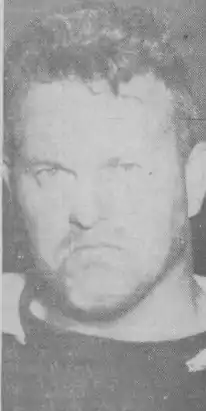George Slagle
George B. "Dutch" Slagle, also called Geoffrey Slagle, was an American football guard and coach. He played one game in the National Football League (NFL) for the Louisville Colonels, and later coached the Wilmington Clippers and Scranton Miners, as well as several high school teams.[1]
 c. 1940 | |||
| Personal information | |||
|---|---|---|---|
| Born: | between 1899 and 1904 Beckley, West Virginia, U.S. | ||
| Died: | Unknown | ||
| Career information | |||
| College: | University of Pennsylvania | ||
| Position: | Guard | ||
| Career history | |||
| As a player: | |||
| |||
| As a coach: | |||
| |||
| Career NFL statistics | |||
| |||
| Player stats at PFR | |||
A native of Beckley, West Virginia, Slagle attended the University of Pennsylvania, where he earned a bachelor's degree and a master's degree.[2][3] After graduating, Slagle spent time professionally with "Atlantic City, Canton [Bulldogs], New York [Giants], Chicago [Bears], Louisville [Colonels], Cincinnati, and Wilmington," according to The Tribune,[1] though his only known game in the National Football League (NFL) came in 1926 with Louisville. The Colonels, after suffering a defeat in the first game of the season, "re-arranged" their lineup for their matchup with the Detroit Panthers, and signed several players including Slagle.[4] In the game, a 0–47 loss, he appeared as a substitute for Pete Vainowski.[5] He was released after the game. Slagle also played for the Boston Shamrocks and a team in Scranton, Pennsylvania, according to The Bridgeport Post.[3]
In 1936, Slagle started a coaching career, becoming the head coach of the newly formed Wilmington Clippers.[6] They played their first season in 1937, compiling a 7–4 record under Coach Slagle.[7] He resigned from his coaching position in 1938, citing salary differences and other coaching offers.[8]
In 1939, Slagle was hired as the head coach of the Scranton Miners, a team in the Eastern Pennsylvania Football League (EPFL).[2] He accepted a position at Pottstown High School in 1940 to be head football coach and English teacher, but resigned in December that year.[9] When asked if he was going to coach a team in 1941, he replied, "I'm not denying and I'm not confirming."[10] He later served as an advisor to Johns Hopkins football coaches as well as several other stints with schools in Philadelphia, Washington, D.C., and Alexandria, Virginia, before becoming Bullard-Havens Technical High School coach in 1960.[11]
References
- "Dutch Slagle Requires No Formal Introduction". The Tribune. August 31, 1939 – via Newspapers.com.

- "George Slagle Named Scranton Pro Coach". The Tribune. August 31, 1939 – via Newspapers.com.

- Johansen, John (August 21, 1960). "Slagle Named Coach At Tech". The Bridgeport Post – via Newspapers.com.

- "Colonels Next For Panthers". Detroit Free Press. October 17, 1926 – via Newspapers.com.

- "Louisville Pros Defeated By Detroit". The Courier-Journal. October 18, 1926 – via Newspapers.com.

- Cartwright, Al (February 26, 1964). "A La Carte". Journal-Every Evening – via Newspapers.com.

- "Dutch Slagle Coaching Record". Pro Football Archives.
- Rinatd, Dick (January 14, 1938). "Calling + + The Turn". Journal-Every Evening – via Newspapers.com.

- "Slagle Quits Pottstown High Grid Coaching Job". The Mercury. December 7, 1940 – via Newspapers.com.

- Lucas, Paul J. (February 10, 1941). "It's Yes and No!". The Mercury – via Newspapers.com.

- Smarter, Joel (September 25, 1960). "Look for Perfection From Tech's New Coach". The Bridgeport Post – via Newspapers.com.
